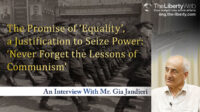The Secret Behind the Breakthrough by Javier Milei, Argentina’s President
An Interview with Marcelo Duclos
The Liberty spoke about the essence of Argentina’s Libertarian Revolution with Marcelo Duclos, one of the authors of “Milei: The revolution they did not see coming,” and an Argentine libertarian journalist who is a long-time acquaintance of President Milei.
Interviewer: Interviewer: Hanako Cho, Akihide Nishihara
Marcelo Duclos:
Marcelo Duclos is a reporter for the PanAm Post from Buenos Aires. He studied journalism at Taller Escuela Agencia (TEA) and went on to pursue a master’s degree in Political Science and Economics at Eseade.
Q: You have a very good relationship with President Milei, so much so that you played in a band together. From your perspective, what kind of person is he?
It seems that the mainstream media tends to criticize him as a dictator, and that they are still unable to understand him as a person.
Marcelo Duclos: Beyond the affection and personal bond I have with him, what may interest the reader about the character of the Argentina president is that he is an honest, direct, determined person, unafraid to break down structures to achieve his goals.
He is very relaxed and liberal when it comes to thinking, as they say, “out of the box.” In fact, when we gave a recital (there will be another one when inflation hits 0%), I was the one who approached him with the idea. It wasn’t even planned a week prior to the big event at Luna Park. He thought it was funny and it was done. The media analyzed the issue as if it were a stroke of genius in political communication, and it got people to talk during the midst of the austerity of the first months of public spending. There are often chasms between reality and what the media interprets.
Milei’s Philosophies are Far From Dictatorship
With regards to the question about a dictator, his liberal philosophy marks the absolute antinomy with any authoritarian perspective.
He would never use his government to reward or punish people, as was done in the past. He is a very decisive person, who does not think twice about dismissing any official or minister who does not follow the program’s roadmap to the letter. But therein lies the confusion. He is not a cyclothymic despot who takes sides according to his mood. His program is not “Follow Milei” or “Do whatever Milei says.”
The program is the platform: reduction of the state, opening up markets, deregulation and freedom. If you want to leave the program, you leave.
Many consider that these issues have to do with a certain authoritarianism, but those who understand see that all that is being done is following the proposed roadmap. And there, the plan is absolutely orthodox and within the possibilities offered by the logical political restrictions placed on a government with a parliamentary minority, a situation that could change in October of this year.
Milei Voices the Unspoken Opinion—His Raw Beliefs Reached Argentinians
Q: As you mentioned in your article, in Argentina, where Mises could be mistaken for a soccer player, libertarian concepts are not well known. Despite this situation, what do you think were the main reasons that Milei’s message reached people and led to him being elected president?
Duclos: Today, at least those who are interested in politics know not only who von Mises or Hayek were, but also their basic ideas. Argentina advanced so far towards interventionist populism that it ended up generating its own antidote.
Evidently, there was discontent in public opinion with the statism of all the parties, but nobody was expressing it in the political arena.
One day on TV, an economist (Milei) appeared and said, without fear of how people might take it, everything that needed to happen in the country. People who shared that view historically thought that it was not a good idea to be explicit in discourse due to various fears. For example, they thought that radical liberal proposals would not gain support from the public or they held prejudices that a “common person” would not be able to understand what they were saying.
Milei set all this aside and gave his most raw analysis. There were more receptive ears than many would have imagined. Within a couple years he became the most popular economist, then he was elected deputy in his electoral debut and in just two years became president—something that had never happened in Argentina.
Milei’s Immense Political Will Carries Him to Success
Q: In the year following his inauguration, Milei reduced the number of government ministries by almost half, achieved a large-scale reduction in public spending and put the government’s finances in surplus. He also carried out large-scale deregulation and privatization, stabilized the money supply (stopping the central bank from printing more pesos) and is trying to create an environment that allows for free monetary competition in the country.
I think the main reason why he was able to quickly implement reforms that many predicted would be impossible is the great power of the presidential political system (of course, I also think his ability to convince the Congress and his bravery played a part).
What do you think of this point (for context, countries like Japan and the UK have a parliamentary cabinet system, and the prime minister needs a lot of time and effort to implement reforms)?
Duclos: Milei took office with very few deputies and senators, since he made his party’s debut at the national level in the election that led it to the runoff, after having obtained approximately 30% . Half of the Chamber of Deputies and a third of the Senate are elected every cycle. When Milei took office, he had very significant political weakness, and no governors from his party.
However, the prerogatives allowed by the National Constitution were used to the maximum with regards to presidential decrees. This made it possible for him to make progress reforming the State.
However, there are many issues that the Constitution prohibits from being approved via decrees. Electoral and tax reforms are some examples. These must go through parliament. For those issues, Milei and his team were able to secure important allies to pass indispensable laws (Ley Bases) and sustained the vetoes of the Executive Branch, which also had to be backed by Congress.
It is likely that a parliamentary style regime would have limited Milei’s room for maneuver, but the truth is that if Argentina had a parliamentary system, populism could not have done the damage it did from the national government either. So I believe that each system has its advantages and disadvantages.
Without a doubt, however, beyond the legal and formal issues of the system, if anything determined the success of the consolidation of the reforms it was not the presidential system but the political will of President Milei.
Q: He also said in his speech that he “has studied politics,” but how would you assess his ability to run the government?
Duclos: With regards to the success of the reforms, my level of surprise is 0%. I wrote the book as soon as Milei took office as president and there I wrote and signed that the measures would be successful, simply because they are the right recipes for certain problems. Argentina was failing because it was implementing the wrong remedies for problems that needed other measures. Of course, this benefited the political class, which had no incentive to do what was right.
What did surprise me was the efficiency with which he managed to run a government with a total minority, with few deputies, a small number of senators and not even a single governor. I thought that the first two years (until the midterm elections that will take place in October, where the ruling party will increase its parliamentary political power) were going to be more chaotic. Not because of government negligence, but because of the opposition and its boycotts.
Fortunately, the government got enough allies to make this first half of what I believe will be the first term (as I think he will be re-elected) as not chaotic as possible. The government managed its political restrictions excellently. If it managed this performance with a total minority, what is to come with more deputies and senators, and eventually in 2027 with like-minded governors, will be much better.
Q: Milei seems to be good at combining ideals with reality in the sense that he is taking firm steps to realize his ideals, such as the gradual abolition of the central bank. How do you think he has developed this ability?
Duclos: His brilliance and his honesty with the Argentinians.
He states where he wants to go and he advances slowly, as much as the conjuncture allows. This happens not only with monetary policy, where it has not even been possible to remove the exchange control, but also in other areas such as the reduction of bureaucracy, deregulation and tax cuts. People perceive that the course is clear and that all actions are directed in the direction promised in the campaign.
No president at the end of his first year in office was able to show these two things before: progress in the direction promised and the results that this is bringing, such as the reduction of inflation or the ending of the fiscal deficit.
Argentinians Have Restored Confidence to Keep Their Own Currencies
Q: In Argentina, since Milei took office, inflation has significantly decreased. He stated in his speech that the country’s risks and interest rates will decrease, that investment, productivity and real wages will increase and, ultimately, poverty and hardship will decrease.
Argentina is a long way from Japan, so it is difficult for us to get a true idea of the situation there. Do you think that the economy and the standard of living in Argentina have truly improved?
Duclos: Little by little, Argentinians are seeing things that were not happening a long time ago. For example, the peace of mind of being able to keep pesos from one month to the next, which are not going to be devalued, or to see that prices in the markets are no longer increasing. But, beyond these issues that started to happen as soon as the President implemented the spending cuts and the end of monetary issuance, the next effects also unrolled: the recession ended and the economy began to grow, wages started to grow above inflation, pensions are recovering and credit began to reappear. This explains why Milei now has a higher positive image today than when he took office. He is even carrying out the most ambitious public spending reduction program in history.
Alignment with President Trump—Intentional or Coincidence?
Q: Milei is a close friend of President Trump, and they share many of the same policies (such as strengthening alliances, streamlining government, withdrawing from the WHO and the Paris Agreement, etc.). It seems that they are trying to destroy various existing orders that the left has built up until now, and create a new international order based on values such as faith, freedom and a small government. What are your thoughts on this? Also, please tell us what you and President Milei think about future diplomacy with the Chinese Communist Party government, which has repressed its citizens and deprived them of freedom.
Duclos: Many journalists in Argentina who superficially interpret President Milei think that the actions taken by the Argentina president are to be in tune with Trump. Those of us who know him and his thinking know that that is nothing more than a mere coincidence.
Had Trump lost the election (or had not done what he is doing) Milei would do exactly the same. This is with respect to the WHO, the Paris Agreement, criticism of the UN, and so on.
With regards to China and the rest of the countries in similar situations, two issues must be taken into account.
Regarding trade, Milei said that Argentina will seek unilateral openness and free trade with all the countries in the world willing to enter into it. He does not even refer to Argentina as a collective. During the campaign, a journalist interviewed him and asked what he was going to do with the products of “our countryside” and he said that he had neither soybeans nor cows—that it is a matter to be solved by their owners. As for trade, the plan is to open up to the whole world. Even if Mercosur does not go along and maintains the restrictions for members, Argentina will surely leave the block.
Regarding human rights violations, Milei also said in international forums that his government will question any violation in any country. But on geopolitical issues, he made it very clear that the most important strategic allies are the United States and Israel.
To analyze whether Argentina will be more or less linked, both with China and with the rest of the countries, we must also take into account the relationship they have, both with the United States and Israel, and especially with the terrorist axis that threatens their existence.



















